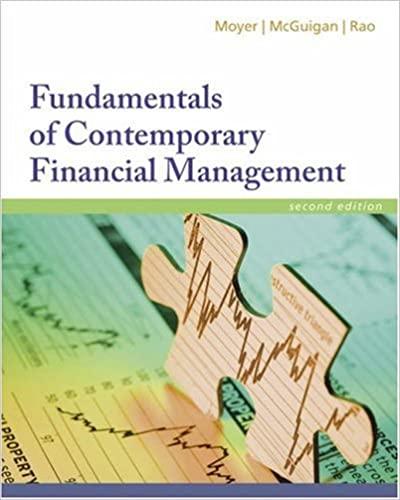Question
Consider the following information about three stocks: State of Economy Probability of State of Economy Rate of Return if State Occurs Stock A Stock B
Consider the following information about three stocks:
State of Economy Probability of State of Economy Rate of Return if State Occurs Stock A Stock B Stock C Boom 0.20 0.38 0.50 0.54 Normal 0.50 0.21 0.16 0.13 Bust 0.30 0.05 0.28 0.45
a-1. If your portfolio is invested 35% each in A and B and 30% in C, what is the portfolio expected return? (Do not round intermediate calculations. Enter the answer as a percent rounded to 2 decimal places.)
Portfolio expected return %
a-2. What is the variance? (Do not round intermediate calculations. Round the final answer to 8 decimal places.)
Variance
a-3. What is the standard deviation? (Do not round intermediate calculations. Enter the answer as a percent rounded to 2 decimal places.)
Standard deviation %
b. If the expected T-bill rate is 4.90%, what is the expected risk premium on the portfolio? (Do not round intermediate calculations. Enter the answer as a percent rounded to 2 decimal places.)
Expected risk premium %
c-1. If the expected inflation rate is 2.90%, what are the approximate and exact expected real returns on the portfolio? (Do not round intermediate calculations. Enter the answers as a percent rounded to 2 decimal places.)
Approximate expected real return % Exact expected real return %
c-2. What are the approximate and exact expected real risk premiums on the portfolio? (Do not round intermediate calculations. Enter the answers as a percent rounded to 2 decimal places.)
Approximate expected real risk premium % Exact expected real risk premium % Consider the following information about three stocks:
State of Economy Probability of State of Economy Rate of Return if State Occurs Stock A Stock B Stock C Boom 0.20 0.38 0.50 0.54 Normal 0.50 0.21 0.16 0.13 Bust 0.30 0.05 0.28 0.45
a-1. If your portfolio is invested 35% each in A and B and 30% in C, what is the portfolio expected return? (Do not round intermediate calculations. Enter the answer as a percent rounded to 2 decimal places.)
Portfolio expected return %
a-2. What is the variance? (Do not round intermediate calculations. Round the final answer to 8 decimal places.)
Variance
a-3. What is the standard deviation? (Do not round intermediate calculations. Enter the answer as a percent rounded to 2 decimal places.)
Standard deviation %
b. If the expected T-bill rate is 4.90%, what is the expected risk premium on the portfolio? (Do not round intermediate calculations. Enter the answer as a percent rounded to 2 decimal places.)
Expected risk premium %
c-1. If the expected inflation rate is 2.90%, what are the approximate and exact expected real returns on the portfolio? (Do not round intermediate calculations. Enter the answers as a percent rounded to 2 decimal places.)
Approximate expected real return % Exact expected real return %
c-2. What are the approximate and exact expected real risk premiums on the portfolio? (Do not round intermediate calculations. Enter the answers as a percent rounded to 2 decimal places.)
Approximate expected real risk premium % Exact expected real risk premium % Consider the following information about three stocks:
State of Economy Probability of State of Economy Rate of Return if State Occurs Stock A Stock B Stock C Boom 0.20 0.38 0.50 0.54 Normal 0.50 0.21 0.16 0.13 Bust 0.30 0.05 0.28 0.45
a-1. If your portfolio is invested 35% each in A and B and 30% in C, what is the portfolio expected return? (Do not round intermediate calculations. Enter the answer as a percent rounded to 2 decimal places.)
Portfolio expected return %
a-2. What is the variance? (Do not round intermediate calculations. Round the final answer to 8 decimal places.)
Variance
a-3. What is the standard deviation? (Do not round intermediate calculations. Enter the answer as a percent rounded to 2 decimal places.)
Standard deviation %
b. If the expected T-bill rate is 4.90%, what is the expected risk premium on the portfolio? (Do not round intermediate calculations. Enter the answer as a percent rounded to 2 decimal places.)
Expected risk premium %
c-1. If the expected inflation rate is 2.90%, what are the approximate and exact expected real returns on the portfolio? (Do not round intermediate calculations. Enter the answers as a percent rounded to 2 decimal places.)
Approximate expected real return % Exact expected real return %
c-2. What are the approximate and exact expected real risk premiums on the portfolio? (Do not round intermediate calculations. Enter the answers as a percent rounded to 2 decimal places.)
Approximate expected real risk premium % Exact expected real risk premium %
Step by Step Solution
There are 3 Steps involved in it
Step: 1

Get Instant Access to Expert-Tailored Solutions
See step-by-step solutions with expert insights and AI powered tools for academic success
Step: 2

Step: 3

Ace Your Homework with AI
Get the answers you need in no time with our AI-driven, step-by-step assistance
Get Started


